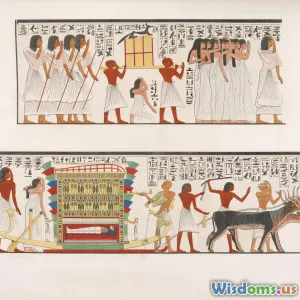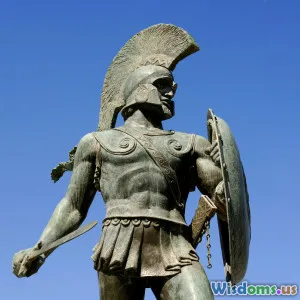
Comparing Stoicism And Daoism On Human Happiness
11 min read Explore how Stoicism and Daoism offer profound, contrasting paths to human happiness through philosophy, nature, and inner peace. (0 Reviews)
Comparing Stoicism and Daoism on Human Happiness
Human happiness—an elusive yet universally sought goal—has inspired countless philosophical traditions. Among these, Stoicism from ancient Greece and Rome and Daoism from ancient China present two rich, distinct approaches. Both offer timeless wisdom on achieving contentment and a flourishing life, but through markedly different lenses. By exploring their core teachings and practical applications, we can deepen our understanding of what it truly means to be happy.
Introduction: The Quest for Happiness Across Cultures
Happiness, or a life well-lived, transcends time and culture. While contemporary psychology tends to frame happiness in terms of emotional well-being and fulfillment, ancient philosophies approached it as a comprehensive way of living. Stoicism, founded by Zeno of Citium around 300 BCE, teaches that happiness (eudaimonia) arises from cultivating virtue and rational control over one’s emotions.
Daoism, attributed to sages like Laozi and Zhuangzi, emphasizes harmony with the natural flow of life (Dao). It suggests that happiness emerges not through struggle against the world, but by effortless concord with it.
This article embarks on a comparative journey through these philosophies, offering insights that may inspire new ways to pursue lasting happiness.
Stoicism: Happiness Through Virtue and Rational Mastery
Core Philosophy and View on Happiness
Stoicism fundamentally teaches that the pathway to human happiness lies in living in accordance with reason and virtue. The Stoics categorize elements of life into what is within our control—our thoughts, judgments, and actions—and what is outside our control—external events, other people's opinions, or outcomes.
As Epictetus famously declared:
“It's not what happens to you, but how you react to it that matters.”
To the Stoics, external goods, health, or wealth are preferred indifferents—nice but not necessary for happiness. True happiness is apathia (freedom from destructive passions) and ataraxia (inner tranquility), achieved by mastering one’s internal world.
Living According to Nature and Reason
Stoicism holds that human nature is rational and social. Thus, living virtuously involves acting with wisdom, courage, justice, and temperance. Wisdom equips us to discern what is good and what is indifferent; courage helps endure hardships without complaint; justice fosters harmony in social relations; and temperance restrains excessive desires.
For example, the Roman emperor Marcus Aurelius, a Stoic practitioner, wrote in his Meditations:
“If you are distressed by anything external, the pain is not due to the thing itself but to your estimate of it; and this you have the power to revoke at any moment.”
By nurturing these virtues, one aligns with reason, achieving inner peace regardless of external fortunes.
Practical Applications and Modern Insights
- Cognitive Behavioral Therapy (CBT) is heavily inspired by Stoic principles, teaching individuals to modify negative thought patterns to reduce distress.
- Stoics encourage mindfulness of moment-to-moment judgments to foster resilience.
- Everyday adversity is viewed as an opportunity to practice virtues rather than causes for despair.
Case Example: Consider someone facing job loss. A Stoic approach involves accepting the event as outside one’s control, focusing efforts instead on constructive responses and maintaining integrity.
Daoism: Happiness Through Harmony and Spontaneity
Core Philosophy and View on Happiness
Daoism, or Taoism, centers on living in harmony with the Dao (道), the fundamental, ineffable principle underlying all existence. Happiness for Daoists is wild and natural, emerging from effortless alignment with the spontaneous rhythms of life.
Laozi, summarizing Daoist thought in the Dao De Jing, wrote:
“Be content with what you have; rejoice in the way things are. When you realize there is nothing lacking, the whole world belongs to you.”
Unlike Stoicism’s rational mastery, Daoism values softness, flexibility, and embracing change without resistance.
Wu Wei: Effortless Action
A central concept is wu wei (无为), or “non-action,” not meaning inactivity but action harmonized with nature’s flow. Instead of forcing or struggling, one acts with minimal effort aligned to Dao’s course.
For instance, the water metaphor commonly used is illuminating: water is soft and yielding, yet carves through rock over time—a paradox of gentle power.
The happiness found in wu wei is typically serene, spontaneous, and free from contrived striving.
Connection to Nature and Simplicity
Daoism highlights the interrelatedness of all beings, encouraging simplicity and humility. Daoists believe that societal conventions and excessive desires cause discontent and that authenticity arises from returning to a natural state.
Zhuangzi, another foundational Daoist philosopher, narrates humorous and thought-provoking parables illustrating the limits of human knowledge and the value of acceptance:
“Happiness is the absence of striving.”
Real-World Insight: Some modern environmental thinkers adopt Daoist ideas to advocate for sustainable living through harmony with the Earth, promoting emotional and ecological wellness as inseparable.
Key Comparisons Between Stoicism and Daoism on Happiness
| Aspect | Stoicism | Daoism |
|---|---|---|
| View of Happiness | Achieved through virtue and reason | Found through harmony and natural spontaneity |
| Relation to Nature | Humans as rational parts of universal logos | Humans living in seamless union with Dao |
| Dealing with Emotions | Control and transform destructive emotions | Embrace fluidity and let emotions flow |
| Ideal Action | Deliberate, virtuous, and rational choices | Effortless action aligned with natural flow |
| Focus | Internal mastery and ethical discipline | Acceptance and simplicity |
Complementary Philosophies
Although different in style, both philosophies converge on the idea that external possessions or status do not secure happiness. Rather, mastery over self—whether through rational control or flowing with nature—is key.
Reflecting Happiness in Contemporary Life
Both Stoicism and Daoism offer invaluable tools in today's high-stress world:
- Stoicism teaches resilience and mental fortitude amidst uncertainty and rapid change common in modern life.
- Daoism provides a calm antidote to burnout by reminding us to slow down, simplify, and trust the natural unfolding.
Integrative Example
A person may use Stoic rational reflection during stressful decision-making and apply Daoist wu wei when embracing situations beyond control—combining discipline with surrender.
Scientific Support
Research suggests:
- Emotional regulation, akin to Stoic practices, improves mental health outcomes.
- Mindfulness and acceptance practices, resonating with Daoist principles, reduce anxiety and enhance well-being.
This emerging synergy underscores their practical value.
Conclusion: Ancient Wisdoms Illuminating Modern Happiness
Stoicism and Daoism, from distinct corners of the world, propose fascinating, sometimes contrasting paths toward the universal goal of happiness. Stoicism's emphasis on virtue, reason, and resilience provides empowerment through discipline, while Daoism's embrace of harmony, spontaneity, and natural simplicity invites serenity through acceptance.
Today, by studying and integrating elements from both, we can enrich our personal philosophies, equipping ourselves to navigate life’s challenges with both strength and grace. As Marcus Aurelius suggests and Laozi advocates, the true art of happiness lies in mastering ourselves and flowing with the rhythms of life.
Ultimately, happiness may emerge not from choosing one philosophy over the other, but from letting these ancient teachings guide us to a balanced, mindful, and meaningful existence.
References:
- Meditations, Marcus Aurelius
- Discourses, Epictetus
- Dao De Jing, Laozi
- Zhuangzi, Zhuang Zhou
- Robertson, D. (2019). How to Think Like a Roman Emperor. W. W. Norton & Company.
- Wong, D. (2016). The Tao of Happiness. Tuttle Publishing.
- Psychotherapy research on CBT and mindfulness applications
Rate the Post
User Reviews
Popular Posts


















